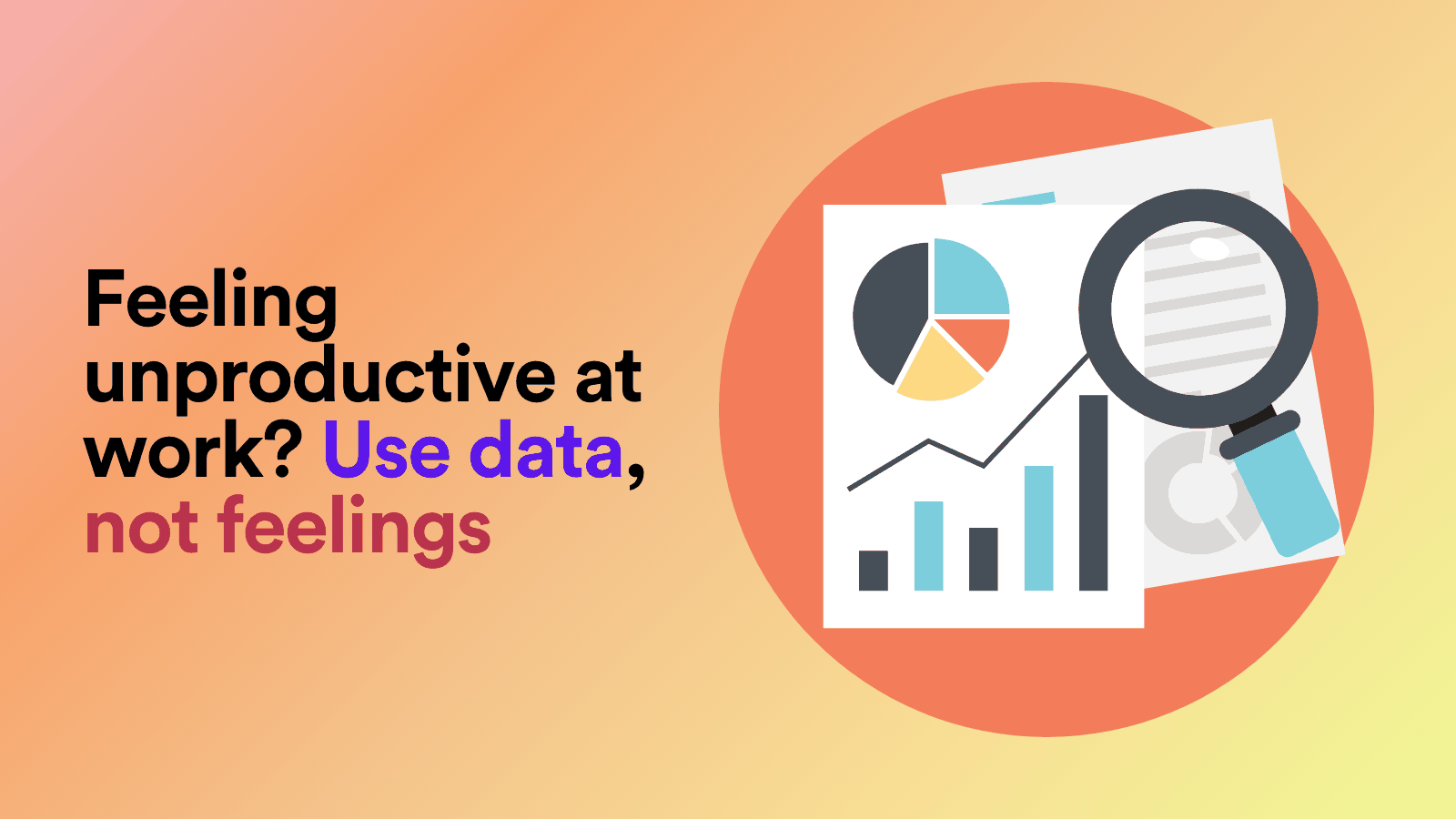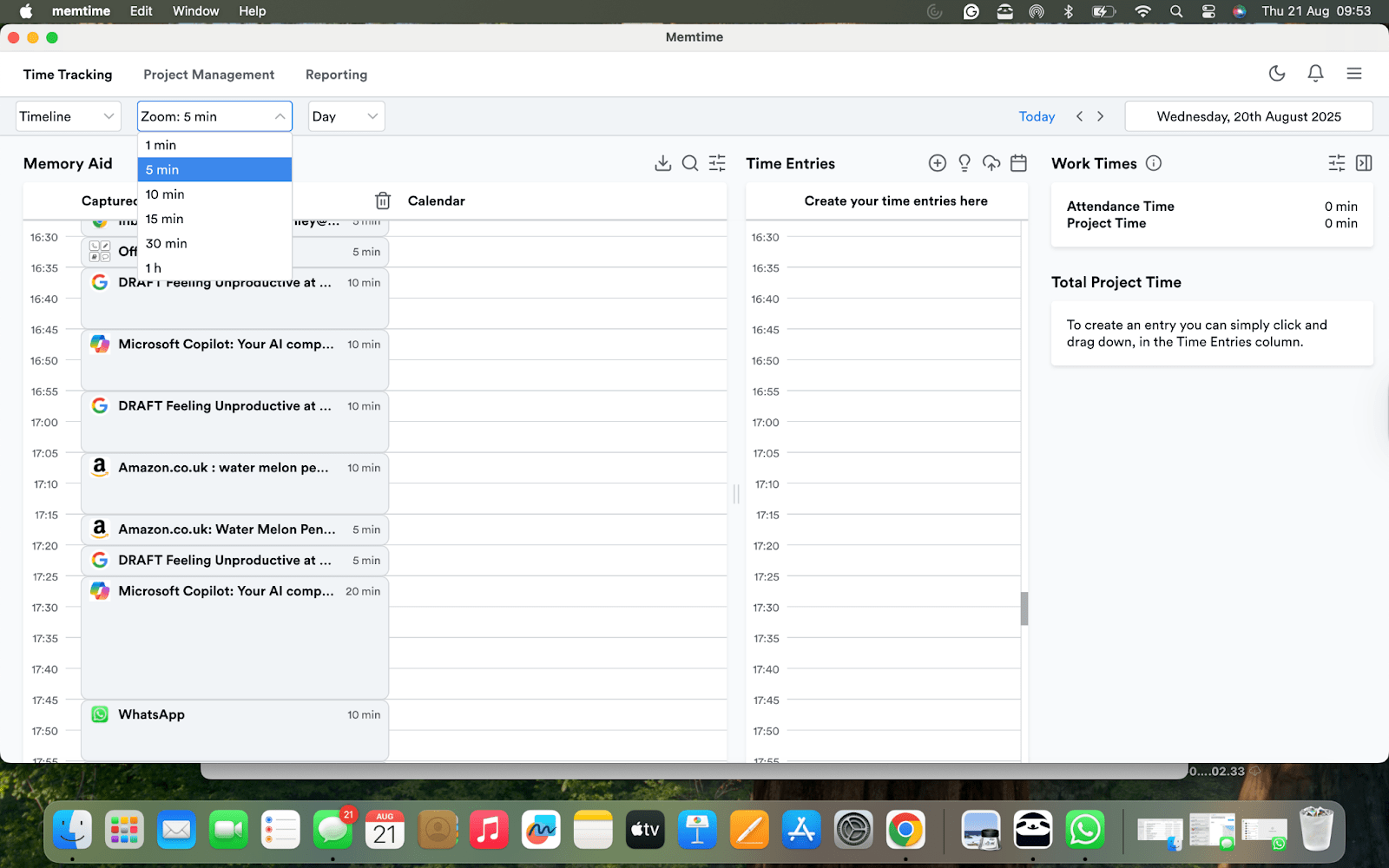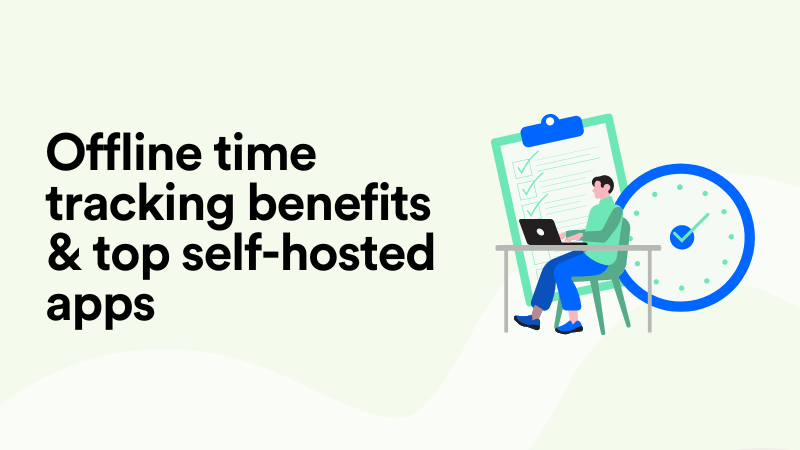Feeling Unproductive at Work? Use Data, Not Feelings

Have you ever found yourself Googling "Why am I feeling unproductive at work?" What about "How can I stop feeling unproductive and unmotivated?" Either way, you're not failing, and you're not flying solo. In fact, searching for it in the first place suggests you care about your productivity. As for the main bedfellows of unproductivity? They include distractions, stress, and hazy objectives; all of the aforementioned can skew perception of your progress.
By examining objective data instead of your emotions or feelings around how you spend your time, you can then see what you actually accomplish and where your focus tends to veer. This data helps you identify the real causes of being unproductive, without judgment. Clarity, focus, and well-informed improvement are what drive productivity rather than perfection.
So, if you’re wondering what to do when you feel unproductive, start by separating feeling from fact – and let numbers guide you forward. With that in mind, here's what this article will address...
Key takeaways
- Emotions are tricky! They can skew your perception of output, so feeling unproductive at work may not always indicate that you are performing below expectations.
- Your progress may lack visibility. Without clear outcomes or feedback, effort can feel invisible and lead to perceived unproductivity.
- If you're freewheeling without structure or passive tracking tools, you're likely missing clarity – causing scattered focus and reduced momentum.
- Feeling unproductive requires a shift in perception. For instance, if you dismiss completed tasks or feel guilt despite all the effort you’re putting in, you're likely misjudging success and ignoring valid progress.
- Rebuilding or maintaining momentum should start with 10-minute sprints. You can also modify your workspace, track energy peaks, and employ a “done” list as opposed to a "to-do" list to reinforce visible progress.
Why you feel unproductive (even when you’re not)
Full disclosure: I’m big on vibes. Gut feelings have led me toward wins and steered me from missteps. But vibes aren’t foolproof – especially at work. The workplace runs on data, the way swimming relies on goggles. Stick with me here…
Humans have been swimming for time immemorial. Then, sometime in the 14th century, some canny people living in Persia devised what’s widely believed to be the first pair of goggles. Crafted from polished tortoise shells (making them transparent), they were used by pearl divers across the Middle East for nearly 200 years.
The point is – you can either feel around for the pearls you perceive to be there, or you can give yourself greater visibility, saving you time and resources.
Without certain tools and processes in place, your progress isn't always visible. This will naturally lead to latent feelings of unproductivity. Moreover, when tasks lack immediate results or a satisfying payoff, it’s easy to dismiss your effort.

Being unproductive vs. feeling unproductive
So, now that we’ve pinpointed a lack of visibility being a key driver to feeling unproductive, let’s look at the difference between actually being unproductive and feeling unproductive.
The difference between being unproductive and feeling unproductive is subtle but significant. One is rooted in measurable output; the other in perception. Understanding this distinction helps you respond with clarity instead of guilt.
As visibility is everything, here’s a little compare and contrast list of both so you can see where you currently land in terms of productivity.
Being unproductive…
- Tasks are left undone, or they’re delayed.
- You tend to spend your time on unrelated distractions, not priorities.
- Equally, your energy is scattered across too many low-impact activities.
- Results are missing or below expectations.
Feeling unproductive…
- You feel you haven’t done enough – even if you have.
- Time was used wisely, but progress feels invisible.
- While results exist, they don’t feel “measurable” or “big enough” to present.
- You’re mentally exhaaaaauuusted, but unsure why – mostly because you feel like you’re putting in a load of effort but, somehow, nothing seems to be done.
Common causes of being unproductive
Often, we mistake being visibly busy for worth or time well spent. However, neglecting slow work, rest, and review time/introspection is equally important when it comes to actual productivity. Productivity is more than producing output; it's also about momentum, intention, and all the small things that add up to the big things in the end.
Being unproductive isn’t purely about higher levels of inertia; it’s often a symptom of deeper issues. Behold some common causes:
- Interruptions: Both digital and human diversions fragment your focus and derail progress.
- Fatigue: Whether physical or mental, this level of tiredness dulls motivation and clouds your decision-making – particularly over time.
- Lack of clarity: When you’re left to freewheel, the absence of structure can leave you unsure of where to begin.
- Perfectionism: This often presents as procrastination, keeping you stuck in planning mode.
- Fear of failure: Meet the paranoid partner of perfectionism. It can prevent you from starting anything in the first place.
- Overcommitment: Feeling you need to say “yes” to everything spreads your energy too thin to make meaningful progress.
When all of the above compounds, it creates a cycle that feels hard to break. The good news? It’s not a permanent situation – you can break free!
What to do when you’re feeling unproductive
Being unproductive requires (yes, you guessed it) positive action. So, you need to reset your goals and learn how to identify any blocks to your current process before starting to remove them. From there, you can rebuild any lost momentum.
If what you’re facing is more about perception than performance (as in you only feel unproductive), that requires reflection on your part. For instance, all effort should be acknowledged. You should consider redefining your interpretation of “success” and know it’s necessary to rest your mind and body without even a whiff of guilt. Either way, clarity is the first step toward reclaiming your time and energy.
Below are some actionable steps to kickstart waning or erratic productivity:
1. Reclaim your workspace
By that, I mean give your workstation an overhaul. You could start by clearing your desk, shutting unused tabs, and removing visual distractions. A tidy space signals a fresh start – not just to you but to anyone around you. This positivity is infectious.
2. Apply sprints
Spend just 10 minutes working on a single microtask. Action frequently comes first, not momentum.
3. You audit your time, why not your energy?
Are you an early bird or a night owl? To find out, track when you feel most alert or drained. You can then align deep work with your natural peaks, and reserve admin tasks for low-energy windows.
4. Negate the noise (literally)
Use noise-canceling headphones or ambient sound to create a mental boundary.
5. Revisit your calendar compassionately
See that non-essential meeting? Cancel it. Similarly, reschedule tasks that require more bandwidth. Permit yourself to adapt your process.
6. Create a “done” list
Instead of obsessing over what’s left to do, chronicle what you’ve already completed. It’s a powerful antidote to false narratives of “laziness” and mitigates any lingering guilt.
7. Step outside yourself (again, literally)
Even a five-minute walk can reset your nervous system and shift your cognitive state. You go touch that grass. Grass is grounding.
8. Ask yourself, “What’s the smallest next step?”
Or, as Anna puts it, “Just do the next right thing” (always room for a motivational Frozen quote). In other words, when in doubt, shrink the task. Progress isn’t always about finishing – it’s about starting with intention.
9. Use a visual timer and/or time tracking software
Be it a clock, a post-it, a calendar, or a time tracking companion like Memtime, all these tools help you to externalize time pressure without inducing stress. Seeing time pass can prompt gentle urgency.

How to measure and improve productivity (without judgment)
While productivity is not a moral metric, it can be a prism through which you understand how you work. Again, focus on identifying and evaluating patterns about your workflow and yourself. This could be identifying what takes longer than usual, what tasks energize or deplete you, and how your focus shifts throughout the day, rather than aiming for output.
Non-invasive passive tracking tools give you a clear picture of your workflow. Memtime (seamless) can help here, without requiring direct input from you.
To improve productivity with clarity and intention, it’s worth remembering to…
- Use passive time tracking tools *ahems* like Memtime to identify recurring distractions or bottlenecks.
- Batch similar tasks to reduce cognitive load and context switching.
- Ensure you schedule deep work during those natural energy peaks you’ve tracked.
- Establish those boundaries around reactive work (e.g., email, meetings) to protect focus time.
- Regularly review your time data (assign a day a week) to identify patterns and modify your priorities.
The goal of productivity is to make room for meaningful work, not to demonstrate your value. Be curious rather than critical when you feel like you're veering off course. Let clarity direct your next course of action, whether you're redefining success or regaining momentum.
For instance, Memtime acts like a digital memory log – quietly recording your work activity in the background. It helps reduce context switching and distractions, boosting focus by tracking what you did, when, and for how long. You can then review your workflow minute-by-minute to spot patterns and stay accountable:

Memtime key features include:
- Automatic time tracking in 1–60 minute intervals
- Unlimited editable time entries based on your activity
- You can export time entries to your favorite project management tools
- Calendar integration which gives you real-time event duration comparison
- Setup is super quick, with it quietly capturing all your app and browser activity
- It’s 100% private!
See how Memtime can start working for you today with our 14-day free trial (we’re sound, like that). All you need is an email address:
Can working from home make me feel less productive?
Indeed, working remotely can make it harder to distinguish between work and personal time. It is more difficult to assess progress in the absence of social cues and structure. A sense of control can be restored by establishing a routine and clearly delineating work areas.
How does burnout affect my sense of productivity?
Burnout drains energy and lowers capacity, making simple tasks feel overwhelming. It leads to procrastination and frustration despite effort. Recovery requires rest and those all-important boundaries – not yet more work.
What role does perfectionism play in feeling unproductive?
Being too meticulous can lead to constant planning and adjusting and this invariably causes a delay in finishing. You may put off beginning tasks out of concern that you won't complete them flawlessly. Breaking that cycle involves letting go of impractical expectations and prioritizing that well worn adage that "done" is preferable to "perfect."
Is multitasking making me less productive?
Yes, switching between tasks frequently hampers concentration and causes mental exhaustion. Even though multitasking seems efficient – and society has told us that it is – it frequently results in shoddy work and overlooked details. Making single-task focus a priority increases output and satisfaction.
Sheena McGinley
Sheena McGinley is a columnist and features writer for the Irish press since 2008. She’s also a business owner that is conscious of how time tracking can foster progress. She wrote for SaaS companies and businesses that specialize in revenue optimization by implementing processes. She has the unique ability to digest complex topics and make them easy to understand. She shares this precious skill with Memtime readers. When she's not making words work for people, Sheena can be found taking (very) brisk dips in the Irish Sea.






